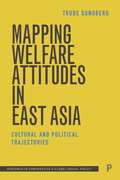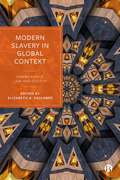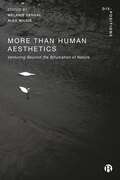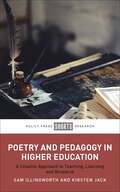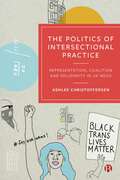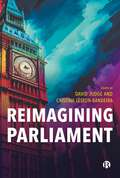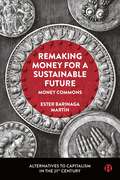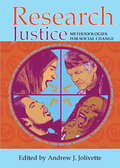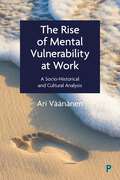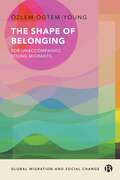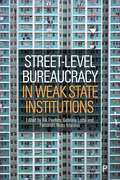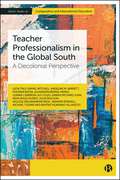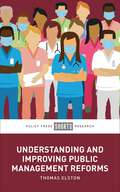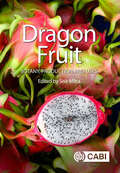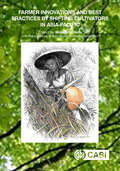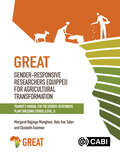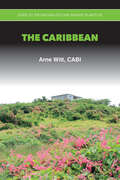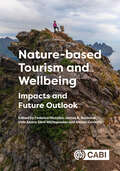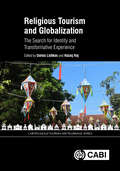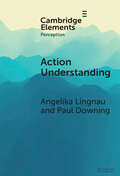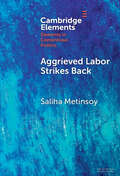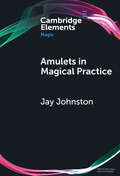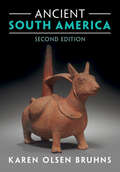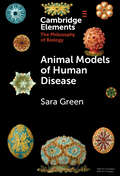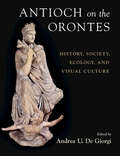- Table View
- List View
Mapping Welfare Attitudes in East Asia: Cultural and Political Trajectories (Research in Comparative and Global Social Policy)
by Trude SundbergEast Asian societies and welfare systems are rapidly changing, creating an increasing need for research that can help to establish sustainable and legitimate welfare systems. This original volume considers welfare attitudes in East Asia, including Mainland China, Hong Kong, Japan, Korea, Macao, Singapore and Taiwan, using qualitative and quantitative research methods. Proposing new methods and approaches to analysing cross-national variations in welfare attitudes, it decentralises dominant European-based concepts and measurements and takes approaches that are sensitive to cultural and political trajectories and the impact of colonialism and gender. This book explores the influence of contextual and individual factors, such as family roles and values, on citizens’ welfare attitudes. It also studies social legitimacy and social bonds to understand how to design and implement sustainable welfare policies.
Modern Slavery in Global Context: Human Rights, Law, and Society
by Elizabeth A. FaulknerThis thought-provoking collection brings together academics from a range of disciplines to examine modern slavery. It illustrates how different disciplinary positions, methodologies and perspectives form and clash together through a kaleidoscopic view to contribute a unique insight into critical modern slavery studies. Providing a platform to critique the legal, ideological and political responses to the issue, experts interrogate the construct of modern slavery and the anti-trafficking discourse which have dominated contemporary responses to and understandings of exploitation. Drawing on a range of global real-world examples, this is a vital contribution to the study of modern slavery.
More-Than-Human Aesthetics: Venturing Beyond the Bifurcation of Nature (Dis-positions: Troubling Methods and Theory in STS)
by Mike Michael Michael Halewood Thomas P. Keating Alexander Damianos Michael L. Thomas Martin Savransky Cecile Malaspina Maximilian Haas Matthew Fuller Andy Goffey Didier Debaise Nicholas GaskillDrawing on the philosophies of Alfred North Whitehead and Félix Guattari, this book develops aesthetics as central to all more-than-human forms of experience, including knowledge practices. Each contribution invites readers on an adventure to explore how this broader view of aesthetics can reshape areas including biomedicine, geological forensics, nuclear waste, race, as well as arts and education. This is an agenda-setting contribution to understanding the significance of aesthetics in science and technology studies, as well social and cultural research more broadly.
Poetry and Pedagogy in Higher Education: A Creative Approach to Teaching, Learning and Research
by Sam Illingworth Kirsten JackThis book invites us to consider the profound impact that poetry can have in shaping personal and professional development in a higher education setting. Suitable for educators, learners, and practitioners, it offers a transformative learning approach in using poetry for teaching, assessment, research, and reflection. The book includes diverse examples, case studies, and practical exercises, demonstrating poetry's application in personal and professional development in a higher education setting. Each chapter guides readers through these processes, empowering them to integrate poetry into their own teaching and learning practices in a way that is creative, inclusive, and impactful.
The Politics of Intersectional Practice: Representation, Coalition and Solidarity in UK NGOs
by Ashlee ChristoffersenIt is increasingly recognized that, to achieve social justice, policies and organizations need to apply an intersectional approach, rather than addressing inequalities separately. However, intersectionality is a challenging theory to apply, as policy makers and practitioners often navigate the confines of divided policy areas. This book examines the use of intersectionality in UK policy and practice, with a specific focus on NGOs, outlining five distinct interpretations of intersectional practice and their implications. Drawing from extensive fieldwork with a diverse range of equality organizations, this book offers invaluable insights into how policy and practice can be organized in more (and less) intersectional ways.
Reimagining Parliament
by David Judge and Cristina Leston-BandeiraWith trust in Parliament and politicians at a seriously low level, there is an increasing need to rebuild our public institutions. This innovative book questions what Parliament should be in the 21st century and how it can be reimagined. It shows how a new democratic parliamentary space can be created to better represent and engage with citizens; to furnish a safe, inclusive and fair working environment for all staff and members; and to secure greater responsiveness and accountability of government. Bringing together a vibrant group of parliamentary scholars and practitioners, it proposes an institutional world of possibilities beyond the present Westminster village, to help restore faith in democracy. .
Remaking Money for a Sustainable Future: Money Commons (Alternatives to Capitalism in the 21st Century)
by Ester Barinaga MartínEngaging imaginatively with the future of money, this accessible book examines the real-life efforts of grassroots movements and activists from across the world who are reclaiming power by designing, organising and implementing complementary currencies. This book will be of interest to all who are interested in constructing a more sustainable and just world.
Research Justice: Methodologies for Social Change
by Andrew J. JolivétteResearch Justice (RJ) is a strategic framework and methodological intervention that seeks to transform structural inequities in research. Research Justice: Methodologies for Social Change builds upon the methodological frameworks developed by the national non-profit organization, DataCenter Research for Justice and is the first book to take a radical approach to socially just, community centred research. Challenging traditional models for conducting social science research within marginalized populations, it examines the relationships and intersections between research, knowledge construction, and political power/legitimacy in society. Presenting a new and highly innovative concept of Collective Ceremonial Research Responsiveness, it envisions equal political power and legitimacy for different forms of knowledge including the cultural, spiritual and experiential. The book examines how the co-existence of these various forms of knowledge can lead to greater equality in public policies and laws that rely on data and research to produce social change. Offering a much-needed analysis of the intersections between Research Methods, Public Policy, Cultural Studies, Anthropology, and Sociology, this unique book will be of wide interest to researchers and students in a variety of disciplines
The Rise of Mental Vulnerability at Work: A Socio-Historical and Cultural Analysis
by Ari VäänänenSince the 1960s, a major mental health crisis has emerged among Western working populations. By analysing the development of various occupational cultures and using extensive data sources, this book captures the history of mental vulnerability in working life. Through a study spanning several decades, the book develops a new understanding of how mental vulnerability has evolved through changes to our working lives and socio-cultural being. It shows how our current knowledge about work, disability and the psyche is influenced by our time and provides intertwining conceptual frameworks and alternatives to current canonised knowledge about mental health in working life.
The Shape of Belonging for Unaccompanied Young Migrants (Global Migration and Social Change)
by Özlem Ögtem-YoungUnaccompanied children and adolescents seeking protection in the UK are among the most vulnerable migrant groups, and often find themselves in a hostile policy environment after enduring traumatic journeys. This book offers an in-depth analysis of the lived experiences of belonging, and the politics and policies of migration. Focusing on unaccompanied young migrants, it investigates the conditions and nature of belonging in the face of the uncertainty, ambiguity and violence of the UK asylum system. Drawing on interviews and the Deleuzo-Guattarian concepts of assemblage, the book provides an empirical and theoretical examination of the belonging of unaccompanied young migrants seeking protection in the UK. Through compelling accounts, the author portrays the complex and paradoxical nature of belonging under precarious conditions, shedding light on the tenacity and fragility of belonging for unaccompanied young migrants.
Street-Level Bureaucracy in Weak State Institutions
by Rik Peeters, Gabriela Lotta, and Fernando Nieto-MoralesIn this book, street-level bureaucracy scholars from South Asia, sub-Saharan Africa, the Middle East, and Latin America analyse the conditions that shape frontline work and citizens´ everyday experience of the state. Institutional factors such as political clientelism, resource scarcity, social inequality, job insecurity, and systemic corruption affect the way street-level bureaucrats enforce rules and implement policies. Inadvertently, they end up implementing inequities in citizens’ access to rights and services — despite efforts to repair organisational deficiencies and broker relations between vulnerable citizens and a distant state. This book illuminates these realities and challenges and provides unique insights into critical themes such as resource scarcities, bureaucratic corruption, control practices, and the complexities of dealing with vulnerable population groups.
Teacher Professionalism in the Global South: A Decolonial Perspective (Bristol Studies in Comparative and International Education)
by Leon Tikly Rafael Mitchell Angeline M. Barrett Poonam Batra Alexandra Bernal Leanne Cameron Alf Coles Zawadi Richard Juma Nidia Aviles Nunez Julia Paulson Nigusse Weldemariam Reda Jennifer Rowsell Michael Tusiime Beatriz VejaranoThis book provides a decolonial critique of dominant global agendas concerning teacher professionalism and proposes a new understanding based on UNESCO-funded research with teachers based in Colombia, Ethiopia (Tigray), India, Rwanda and Tanzania. Outlining from a teacher’s perspective how teacher professionalism may be conceptualized, this book critiques dominant global narratives and conceptions based on deficit discourses. The authors argue that a decolonial lens can help to contextualize the perspectives, experiences and material conditions of teachers in the global South, and the value of such a framework for informing global debates and decision-making in education.
Understanding and Improving Public Management Reforms
by Thomas ElstonWhy do top-down reforms to public services so often over-promise and under-deliver? Using five concepts from psychology, economics and organisational sociology, Thomas Elston addresses this pressing question of good governance. Rather than focusing on the challenge of implementation, Understanding and Improving Public Management Reforms reveals how flawed policy design is often the major contributor to reform failure. Cognitive bias, restrictive social institutions and inattention to ‘quiet costs’ during the policy-making process are essential to explaining the poor track record of reforms to date – and point the way towards better decision-making in future. Written for policy professionals, service managers, students and researchers alike, this concise, practical and multidisciplinary study draws on varied examples to help reconceive the perennial problem of public management reform – and to propose new solutions.
Dragon Fruit: Botany, Production and Uses (Botany, Production and Uses)
by Nigel P. Taylor Pradyot K. Pathak Kundan Kishore Ankita Sahu Prinya Wongsa Taner Bozkurt Özhan Simsek Joanna Cho Ying Phebe Ding Long Haibo Tang Liangde Li Huadong Hamide Gubbuk Recep Balkic Lokman Altinkaya Leila Aparecida Pio Renato Paiva Mai Van Tri Dinh Thi PhuongDragon fruit (pitaya) is a perennial climbing cactus, native to the tropical areas of North, Central and South America. It is suited to tropical and subtropical regions and is commercially grown in an increasing number of countries, including Israel, Australia and the USA. Dragon fruit generates considerable consumer interest because of its exotic appearance and potential health benefits. The fruit is rich in nutrients and phytochemical compounds. It can be eaten fresh or used in the preparation of juices, jellies, jams, etc. The natural bioactive compounds in pitaya have the potential to be exploited in food, pharmaceutical and cosmetic industries. Increasingly cultivated worldwide, the plant is drought-resistant, easily adapts to light intensity and high temperatures, and has a tolerance to a wide range of soil salinities. With ongoing global warming, dragon fruit has great potential as a new crop for many more countries. This book is a compilation of the current state of knowledge on dragon fruit physiology, cultivation, production technology, postharvest management and processing, and is written by leading international authors.
Farmer Innovations and Best Practices by Shifting Cultivators in Asia-Pacific
by Malcolm CairnsThis book, the third of a series, shows how shifting cultivators, from the Himalayan foothills to the Pacific Islands, have devised ways to improve their farming systems. Using case studies collected over many years, it considers the importance of swidden agriculture to food security and livelihoods, and its environmental significance, across multiple cultures, forest and cropping systems. There is a particular focus on soil fertility and climate change challenges. It is a 'must read' for those who realize that if the lives of shifting cultivators are to be improved, then far more attention needs to be directed to the indigenous and often ingenious innovations that shifting cultivators have themselves been able to develop. Many of these innovations and best practices will have strong potential for extrapolation to shifting cultivators elsewhere and to farming systems in general. This book: - Highlights innovations of shifting cultivators. - Combines solid science with accessible language and outstanding artwork. - Provides a collection of case studies unprecedented in its scope. This book will be suitable for students and researchers of agriculture, anthropology, sociology, agricultural economics, human ecology, ethnobotany, forestry, agroforestry, agronomy, soil science, farming systems, geography, environmental science and natural resource management.
Gender-responsive Researchers Equipped for Agricultural Transformation, Level 2.: Trainer’s Manual for the Gender-Responsive Plant Breeding Course
by Dr Margaret Najjingo Mangheni Professor Hale Ann Tufan Dr Elizabeth AsiimweThis manual presents the training process for the Gender-Responsive Plant Breeding course, implemented by Makerere and Cornell Universities, over a period of five years (2016-2020), under the Gender-Responsive Researchers Equipped for Agricultural Transformation (GREAT) project funded by the Bill and Melinda Gates Foundation. It has five broad parts: I) Introduction; II) Required preparation before the course; III) Phase one (9-day, face-to-face training); IV) the 5-month Field Training phase; and V) Phase two (5-day, face-to-face training). Each session consists of specific learning objectives, session plans and slides, delivery methods, practical exercises and examples, as well as relevant tips and synthesized take-home messages. The sessions were developed by an international multidisciplinary team of experts in gender and agriculture and subjected to a rigorous peer review and quality assurance process. GREAT aims to contribute to building a pool of gender-responsive agricultural researchers able to advance more equitable and effective agricultural systems in Africa and beyond. This manual is for all facilitators/trainers interested in applied, gender responsive agricultural research.
Guide to the Naturalized and Invasive Plants of the Caribbean
by Arne WittThe Caribbean region is one of the world's greatest centres of biodiversity. It includes about 11,000 species of plants of which 72% are found nowhere else on earth. Endemic vertebrates include all of the 189 species of amphibians present in the Caribbean; 95% of the 520-reptile species; 26% of the 564-bird species; and 74% of the 69 species of mammals, mostly bats. Species endemic to this hotspot represent 2.6% of the world's plant species and 3.5% of the world's vertebrate species. This biodiversity, and the livelihoods of people that depend on it are threatened by, among others, the uncontrolled spread of invasive alien species (IAS). This Field Guide has been developed to help address one of the barriers to effective IAS management, which is the lack of information on the presence, impact and management of invasive alien plant species in the Caribbean. In general, we have only included those species that we consider to be threatening biodiversity and livestock production.
Nature-based Tourism and Wellbeing: Impacts and Future Outlook
by Federico Niccolini, James R. Barborak, Iride Azara, Eleni Michopoulou and Alessio CavicchiAll around the world, as growing numbers of tourists and recreational visitors flock to protected and other natural areas stimulated by a renewed search for physical, mental, and even spiritual health and wellbeing, different practices and behaviours emerge. This book brings together experiences and perspectives from many countries around the world. On the demand side, the experiences are united by the desire of tourists to find a real and regenerating connection in nature. On the supply side, designing and managing tourist systems that preserve natural capital in good condition requires great professionalism to dynamically maintain a fragile and delicate balance between tourists, local communities, and nature. By understanding the attitudes and emerging norms of behaviour within the context of nature-based tourism, we can begin to sketch a roadmap to enable more holistic, enjoyable, healthy and responsible visitor experiences; facilitate ecosystem conservation; contribute to the mental and physical wellbeing of tourists and outdoor recreationists; and build sustainable economies and resilient destinations and livelihoods. This book is of great relevance for academic researchers, advanced tourism and conservation students, and practitioners working in nature-based tourism and conservation, especially those with a focus on natural destinations, as well as those interested in consumer behaviour, business and management, recreation, and sustainable tourism development.
Religious Tourism and Globalization: The Search for Identity and Transformative Experience (CABI Religious Tourism and Pilgrimage Series)
by Vitor Ambrósio Silvia Aulet Serrallonga Caglar Bideci Mujde Bideci Elzbieta Bilska-Wodecka Dr Dino Bozonelos Dr Nour Farra-Haddad Stephen F. Haller Jaffer Idris Antonietta Ivona Isilda Leitão Dimitrios Mylonopoulos Polyxeni Moira Eleanor O’Keeffe Spyridon Parthenis Donatella Privitera Ricardo Nicolas Progano Alison T. SmithIs it possible to identify the positive and negative effects of globalization on religious tourism or to estimate the transformation of the internal and external constructs of pilgrimage by these effects? In order to address these questions, this book highlights the importance of the search for identity and transformative experience during religious tourism. It also looks at how, recently, globalization has played a part in the changes of the concept of personal and social identity and the transformative experience of pilgrimage. The chapters, consisting of carefully selected case studies, analyse possible effects including the adoption of different new rituals, new pilgrims' values, changes of tradition, acceptance of technologic innovations, development of new business models, and other environmental and sociocultural changes. The book provides: · a conceptual framework for understanding the impacts of globalization; · integrated cross-disciplinary approaches; and · an insight into major religious travel practices in the age of identity challenges and worldwide transformations. It will be suitable for researchers and students of religious tourism, pilgrimage, identity tourism, as well as related subjects such as sociology, anthropology, psychology, theology, history and cultural studies.
Action Understanding (Elements in Perception)
by null Angelika Lingnau null Paul DowningThe human ability to effortlessly understand the actions of other people has been the focus of research in cognitive neuroscience for decades. What have we learned about this ability, and what open questions remain? In this Element the authors address these questions by considering the kinds of information an observer may gain when viewing an action. A 'what, how, and why' framing organises evidence and theories about the representations that support classifying an action; how the way an action is performed supports observational learning and inferences about other people; and how an actor's intentions are inferred from her actions. Further evidence shows how brain systems support action understanding, from research inspired by 'mirror neurons' and related concepts. Understanding actions from vision is a multi-faceted process that serves many behavioural goals, and is served by diverse mechanisms and brain systems.
Aggrieved Labor Strikes Back: Inter-sectoral Labor Mobility, Conditionality, and Unrest under IMF Programs (Elements in Contentious Politics)
by null Saliha MetinsoyWhy do we see large-scale labor protests and strikes under some IMF programs such as in Greece in 2010 and not in others such as in Ireland in the same year? This Element argues that extensive labor market reform conditions in an immobile labor market generate strong opposition to programs. Labor market reform conditions that decentralize and open up an immobile labor market cause workers either to lose in terms of rights and benefits, while being stuck in the same job or to fall into a less protected sector with fewer benefits. Conversely, in more mobile labor markets, wage and benefit differentials are low, and movement across sectors is easier. In such markets, labor groups do not mobilize to the same extent to block programs. The author tests this theory in a global sample and explores the causal mechanism in four case studies on Greece, Ireland, Latvia, and Portugal.
Amulets in Magical Practice (Elements in Magic)
by null Jay JohnstonThis Element takes as its remit the production and use of amulets. The focus will be on amulets with no, or minimal, textual content like those comprising found stone, semi-precious gem and/or animal body parts. That is a material form that is unaccompanied by directive textual inscription. The analysis considers this materiality to understand its context of use including ritual and metaphysical operations. Through discussion of selected case studies from British, Celtic, and Scandinavian cultures, it demonstrates the associative range of meaning that enabled the attribution of power/agency to the amuletic object Uniquely, it will consider this material culture from an interdisciplinary perspective, drawing together insights from the disciplines of cultural studies, religious studies, 'folk' studies, archaeology and Scandinavian studies. It develops the concept of 'trans-aniconism' to encapsulates an amulet's temporal relations and develops the proposition of 'landscape amulets.'
Ancient South America
by null Karen Olsen BruhnsAncient South America, 2nd edition features the full panorama of the South American past from the first inhabitants to the European invasions Isolated for all of prehistory and much of history, the continent witnessed the rise of cultures and advanced civilizations rivalling those of Europe, Asia, and Africa. Independently of developments elsewhere, South American peoples invented agriculture, domesticated animals, and created pottery, elaborate architecture, and the arts of working metals. Tribes, chiefdoms, and immense conquest states rose, flourished, and disappeared, leaving only their ruined monuments and broken artifacts as testimonials to past greatness. This new edition is completely revised and updated to reflect archaeological discoveries and insights made in the past three decades. Incorporating new findings on northern and eastern lowlands, and discussions of the first civilizations, it also examines the first inhabitants of Brazil and Patagonia as well as the Andes. Accessibly written and abundantly illustration, the volume also includes chronological charts and new examples.
Animal Models of Human Disease (Elements in the Philosophy of Biology)
by null Sara GreenThe crucial role of animal models in biomedical research calls for philosophical investigation of how and whether knowledge about human diseases can be gained by studying other species. This Element delves into the selection and construction of animal models to serve as preclinical substitutes for human patients. It explores the multifaceted roles animal models fulfil in translational research and how the boundaries between humans and animals are negotiated in this process. The book also covers persistent translational challenges that have sparked debates across scientific, philosophical, and public arenas regarding the limitations and future of animal models. Among the are persistent tensions between standardization and variation in medicine, as well as between strategies aiming to reduce and recapitulate biological complexity. Finally, the book examines the prospects of replacing animal models with animal-free methods. The Element demonstrates why animal modeling should be of interest to philosophers, social scientists, and scientists alike.
Antioch on the Orontes: History, Society, Ecology, and Visual Culture
by De Giorgi, Andrea U.Antioch on the Orontes was one of the most important cities of the ancient Mediterranean world. A hinge between the Mediterranean, Central Asia, and the Far East, its commercial and cultural prominence spanned centuries, from its Seleucid foundation to the Islamic conquest and beyond. This volume offers an archaeological and historical overview of Antioch from its origins through late antiquity. Drawing on a vast body of modern research, it explores the city's built environment, the institutions that shaped it in fundamental ways, intellectual currents, and ecological setting. Significantly, analysis of Antioch's defining ecology is incorporated into accounts of imperial building programs, religious rifts, and the agency of the local community. The study also foregrounds the cultural responses to the environmental downturns and disasters that have continually wreaked havoc on the city. At its center is the Antiochene population, whose fierce determination enabled the city to overcome repeated episodes of desolation and destruction.
